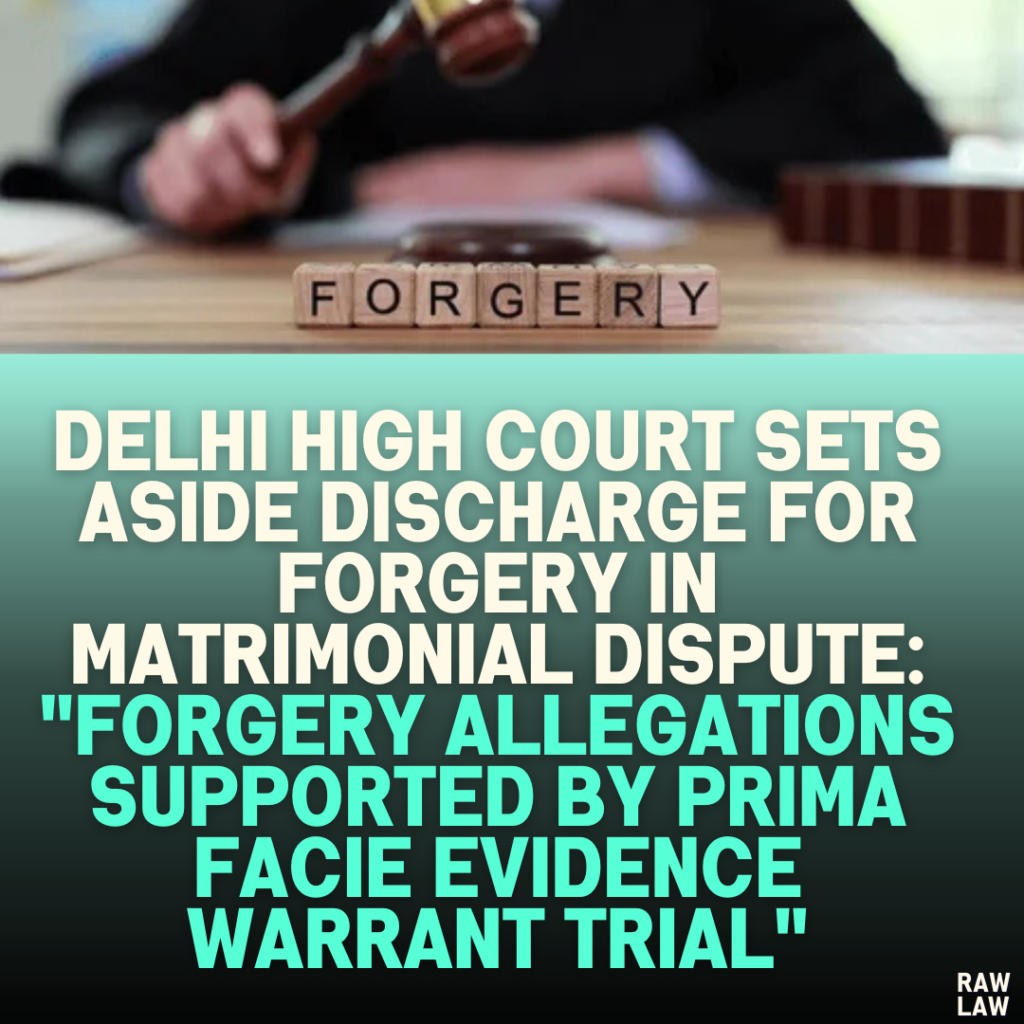Court’s Decision
The Delhi High Court ruled that the accused, initially discharged under Section 468 IPC (Forgery for Purpose of Cheating), must face trial based on sufficient prima facie evidence. Charges under Sections 420 (Cheating), 468 (Forgery for Purpose of Cheating), and 471 (Using Forged Documents as Genuine) IPC were upheld. The Court reasoned that allegations of forgery and cheating, supported by forensic evidence and witness testimony, were credible enough to warrant judicial scrutiny during the trial phase.
Facts
- Background of the Case:
The complainant, estranged from her husband (the accused) due to matrimonial discord, alleged that he forged her signature to obtain property-related documents during the closure of a joint home loan. This loan was taken to purchase a property jointly held by the accused and his mother. - Key Allegations:
- The accused submitted a forged authorization letter and a photocopy of the complainant’s expired passport to the bank, enabling him to retrieve property documents.
- The complainant denied authorizing such actions and claimed wrongful loss due to these actions.
- Charges Filed:
Based on the FIR and the investigation, charges under Sections 406 (Criminal Breach of Trust), 420 (Cheating), 468 (Forgery), and 471 IPC (Using Forged Documents as Genuine) were framed against the accused.
Issues
- Did the accused commit forgery under Section 468 IPC?
- Are charges under Sections 420 and 471 IPC sustainable based on the evidence?
- Does the evidence justify the framing of charges for trial?
Petitioner’s Arguments
- Forgery Allegation:
The complainant claimed her signatures on the authorization letter and the expired passport were forged. Forensic reports supported her claim, identifying discrepancies between her specimen signatures and those on the documents. - Eyewitness Testimony:
A bank official testified that the accused submitted the documents in the complainant’s absence. - Wrongful Loss:
The complainant argued that the accused’s actions resulted in her wrongful deprivation of property rights and financial loss.
Respondent’s Arguments
- Allegations Are Matrimonial in Nature:
The accused contended that the allegations stemmed from ongoing divorce proceedings and were aimed at harassment. - Inconclusive Forensic Report:
The accused highlighted that the forensic report was inconclusive, arguing it did not definitively prove forgery. - No Wrongful Loss:
Since the property was solely in the accused’s and his mother’s names, the complainant had no legal entitlement to the documents. - Complainant’s Consent:
The accused argued that the complainant herself requested the loan closure to protect her credit score.
Analysis of the Law
- Standard for Framing Charges:
The Court reiterated that, at the stage of framing charges, the prosecution’s evidence need only establish a prima facie case. The test is whether the material raises a “grave suspicion” against the accused, sufficient to justify a trial. - Forgery Allegations:
The Court noted that the complainant’s allegations were corroborated by:- A forensic report indicating discrepancies in signatures.
- Eyewitness testimony from a bank official confirming the complainant’s absence.
- Section 468 IPC:
The Court observed that forgery intended to cheat is a serious offense. Even if the forensic evidence was inconclusive, the allegations and supporting testimony were sufficient to justify framing charges under Section 468 IPC.
Precedent Analysis
The Court relied on these precedents:
- State (NCT of Delhi) v. Shiv Charan Bansal (2020): Courts must consider whether the material discloses a prima facie case without evaluating its probative value.
- Soma Chakravarty v. State through CBI (2007): If evidence creates a “grave suspicion” against the accused, charges must be framed.
- Manjit Singh Virdi v. Hussain Mohammed Shattaf (2023): Discharge at the charge-framing stage is justified only in the absence of credible material supporting the allegations.
Court’s Reasoning
- Prima Facie Evidence of Forgery:
- The forensic report indicated inconsistencies between the complainant’s specimen signatures and the disputed signatures.
- Witness testimony corroborated the complainant’s claim that the accused submitted forged documents.
- Cheating and Forgery Interlinked:
The Court noted that forgery presupposes cheating. Since the complainant alleged wrongful loss due to forged documents, the charges under Sections 420 and 468 IPC were interrelated and could not be segregated. - Need for Trial:
The Court emphasized that determining the authenticity of evidence and the accused’s culpability was a matter for trial. Discharging the accused at this stage would be premature.
Conclusion
The Delhi High Court set aside the accused’s discharge under Section 468 IPC and directed the trial to proceed on charges under Sections 420, 468, and 471 IPC. It clarified that its observations were limited to the charge-framing stage and would not influence the trial’s outcome.
Implications
- Strengthens Victim’s Recourse:
The judgment underscores that allegations of forgery and cheating, when backed by prima facie evidence, warrant a full trial. - Guidance for Charge Framing:
It reaffirms that courts should adopt a liberal approach at the charge-framing stage, ensuring accused persons are not prematurely discharged. - Matrimonial Disputes and Criminal Allegations:
The case highlights the interplay between matrimonial discord and criminal allegations, emphasizing the need for judicial vigilance in such matters.




Pingback: Bombay High Court Upholds Eviction Decree: "A Landlord Is the Best Judge of His Bona Fide Requirement," Affirms Right to Reclaim Property for Family Business Expansion - Raw Law